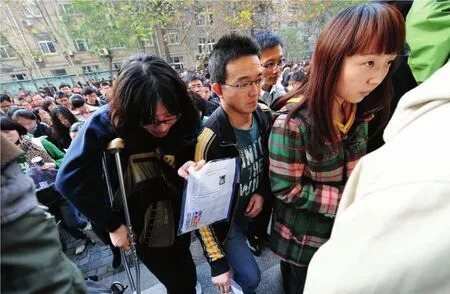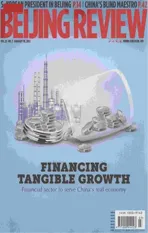Opening the Door of Opportunity
2012-10-14ThegovernmentisworkingtoeliminatediscriminatorypracticesinrecruitmenttothecivilserviceByLiLi
The government is working to eliminate discriminatory practices in recruitment to the civil service By Li Li
Opening the Door of Opportunity
The government is working to eliminate discriminatory practices in recruitment to the civil service By Li Li
Three HIV-carriers wrote a joint letter to the Legislative Affairs Office of the State Council, China’s cabinet, on November 28, 2011, calling on the government to repeal discriminatory administrative regulations that prevent people with HIV from entering the civil service.
The regulations they are seeking to amend include the General Civil Service Recruitment Physical Examination Criteria, the Civil Service Special Physical Examination Criteria and the Measures for the Implementation of the Law on the Prevention and Treatment of Infectious Diseases.
China’s Employment Promotion Law,as well as the Regulations on the Prevention and Treatment of HIV/AIDS, guarantee HIV-positive people’s right to work.
However, the three petitioners, from Anhui, Sichuan and Guizhou provinces respectively, said they were wrongly denied teaching jobs because mandatory blood tests revealed they were HIV positive, even though they had passed written tests and interviews.
They fi led separate lawsuits against their local governments after provincial education authorities rejected their applications for teaching jobs.
Courts ruled against the claims of the persons in Anhui and Sichuan in 2010.
In the third lawsuit filed in Guizhou Province, a judge told the plaintiff last October the court would not accept the lawsuit and suggested that he turn to the local government to solve the issue.
In their letter, the three petitioners also accused existing regulations of enforcing isolation during the treatment of people living with HIV/AIDS, which they said is “a serious violation of medical common sense.”
This high-pro fi le appeal has drawn attention to the much broader problem of discrimination in China’s civil service recruitment.
Rampant malpractice
On November 22, 2011, the Constitutionalism Research Institute of the Beijing-based China University of Political Science and Law released a report after studying recruitment requirements for 9,762 government jobs offered in 2011. It is the second annual report of this kind released by the institute, following the fi rst one in 2010.
The report garnered wide media interest as the civil service is considered a prime career for many of China’s college graduates.
A total of 970,000 applicants took the exam for civil service recruitment across the country on November 26 and 27, 2011. They competed for only 18,000 posts in central and local government departments.
According to the report, limits in terms of age, gender and health conditions are common in advertised positions.
For example, the 92 positions offered by the civil aviation air police corps required candidates to be under the age of 28. A few specialized positions were reserved only for doctorate holders and/or candidates no older than 40 years old. In addition, 0.4 percent of total posts required candidates to possess certain physical characteristics, such as height.
In fact, even the civil service recruitment exam restricted eligibility to Chinese nationals aged from 18 to 35, though no evidence suggests people aged above 35 cannot be competent enough to become civil servants.
Vacancies in which successful candidates were, allegedly, recruited based on their gender increased from 1,203 in 2010 to 1,519.“These vacancies were mostly reserved for men, or the job descriptions suggested that only men should apply,” the report says.
The health criteria for civil service recruitment also automatically disqualify people living with HIV/AIDS. However, according to the report, the consensus among medical experts is that HIV-carriers are just as able as healthy people and should not be excluded from the recruitment process.
In addition to age, gender and health conditions, the report also cites numerous instances of discrimination on grounds of political and residential origin, including where an applicant was born and where his or her permanent residence is registered.
According to the report, 19.1 percent of posts required membership of the Communist Party of China or the Communist Youth League, 15.6 percent required candidates to be a certain gender, and 11.5 percent had requirements based on residential status.
“Government agencies and public institutions should have zero tolerance for discrimination in employment and take the lead in rooting it out,” said Liu Xiaonan, chief author of the report and an associate law professor of the Constitutionalism Research Institute at the China University of Political Science and Law.
The report focuses on employment fairness in six categories of organizations—people’s congresses, courts, procuratorates,women’s federations, disabled persons’ federations and trade unions.
Liu said that as legislative and judicial organs, the fi rst three categories of organizations should clearly understand that laws in China forbid employment discrimination, while the other three organizations are devoted to protecting the rights and interests of certain groups of people and should therefore play an exemplary role in eliminating employment discrimination.

FIERCE COMPETITION:College graduates take part in the civil service recruitment exam in Nanjing,Jiangsu Province,on November 27,2011
However, the report shows that even these organizations have failed to offer equal opportunities to job seekers. For example gender discrimination existed in recruitment requirements for 939 available posts in the court system in 2011, accounting for 31.2 percent of its total vacancies. “The situation is even worse than I had imagined,” Liu said.
However, Liu did note a few positive developments in 2011 compared with 2010,such as the increase in the maximum age of applicants from 35 to 40 for some higherlevel government positions.
“This relaxation of the rules demonstrates how little the cap on age is justi fi ed in the recruitment of civil servants,” she said.
According to the report, other improvements included deleting the “good-looking”requirement that used to be common for many vacancies, relaxing restrictions on applicants with certain diseases and relaxing the requirements on applicants’ height and sight for some police vacancies.
In addition to timely removal of discriminatory provisions, the report also suggests a review mechanism for discrimination in civil service recruitment be established.
A long way to go
Liu said that the reason her institute chose to study employment fairness in China by examining recruitment practices of government agencies and public institutions is that they believe the government should serve as a model for safeguarding people’s right to employment.
According to the Regulations on the Employment of the Disabled, which became effective in May 2007, China’s government agencies, public institutions and non-governmental organizations and enterprises must ensure that disabled employees account for no less than 1.5 percent of their total employees;otherwise, they are liable to pay fines to the employment security fund for the disabled.
Zhou Wei, a law professor at Sichuan University, said that such a stipulation actually dampens the chances for disabled job seekers who are interested in civil service.“Most government agencies choose to pay the fi ne, which can be easily listed as part of their operational expenses and covered by the government budget. When even government agencies fail to meet this ratio, how can we expect enterprises to hire disabled employees?” Zhou said.
According to Liu’s research, additional discriminatory policies are also adopted while applications for government jobs are being appraised. “While some posts don’t exclude women in their publicized job requirements,only men are actually considered for the vacancies during the recruitment. This is rather common,” Liu said.
Before the release of its report, Liu’s institute approached the State Administration of Civil Service (SACS), which is in charge of civil service recruitment, and the human resources departments of some government agencies and public institutions. It also invited their representatives to a seminar on the elimination of discrimination in civil service recruitment.
According to theSouthern Weekly, a newspaper based in Guangzhou, Guangdong Province, the SACS asked for a copy of the report but declined to participate in the seminar, saying “We are shorthanded at the end of a year.”
Days after the release of the report, Nie Shengkui, head of the Examination and Recruitment Department of the SACS, defended the current civil service recruitment practices by saying that it was necessary to set high standards to guarantee that future civil servants could perform their duties.
“Civil service recruitment is to select qualified people for government vacancies,not to promote employment. So its strict criteria have nothing to do with employment discrimination,” Nie said.
Nie’s remarks were widely criticized on the Internet for a lack of awareness of equality.
Zhou said while academia in China has reached a consensus on what constitutes employment discrimination, academics’ views are widely different from those of responsible of fi cials, which would be the largest barrier to effective recti fi cation of the malpractice.
